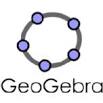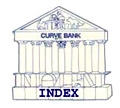| Back to . . . .
 Curve Bank Home Curve Bank Home
Przemyslaw Kajetanowicz
Institute of Mathematics and Computer
Science
Wroclaw University of Technology
Wroclaw, Poland
Przemyslaw.Kajetanowicz@pwr.wroc.pl
|
|

The Cycloid Family of Curves
continued . . .
Epitrochoid
|
|
The graphics in
this deposit were created
using GeoGebra.

|
NCB
Deposit # 136
|
|
WARNING:
Be
patient! You
may have to download a
newer version of Java. With Java present, your
computer should download the Java
driven animation files.
|
 |

|
|
Now you may enjoy seeing other
animations of the classic cycloid. Go to . . . .

|
Arguably,
the Cycloid Family of
curves features the most distinguished group of investigators in
all mathematics.
Galileo and Father Mersenne are credited with being the first to name
and discuss its special properties (1599). They were
followed
by Torricelli, Fermat, Descartes, Roberval, Wren, Huygens, Desargues,
Johann Bernoulli, Leibniz, Newton, Jakob Bernoulli, L'Hôpital and
others.
This is probably too brief a list.
One might assert that a
fascination with the motion of the cycloidal curves led a century of
civilization's greatest mathematicians into modern mathematics.
Certainly, the
birth of the calculus, especially the calculus of variations,
flourished
among these remarkable men who were determined to understand its many
special
qualities.
Because of the frequency of
disputes among mathematicians in the 17th century, the cycloid became
known as
the "Helen
of Geometers." The name is appropriately based on
Greek
mythology.
Helen was the most beautiful woman in the world. The Trojan war
that followed her capture was one of the fiercest conflicts in ancient
times
|
|
References
Yates, R. C., Curves
and their Properties,
NCTM, 1952. Also in A Handbook on Curves and their Properties,
various publishers including the NCTM.
Weisstein, Eric. W., CRC
Concise
Encyclopedia of MATHEMATICS, Chapman & Hall/ CRC, 2nd ed., 2003.
|
For MATHEMATICA ® code that
will also create many
of
these graphs:
Gray,
A., MODERN DIFFERENTIAL GEOMETRY of Curves and Surfaces with
Mathematica®, 2nd. ed., CRC Press, 1998.
For Maplesoft code
to create several members of the cycloid family see < ..//cycloidmaple/cycloid.htm >
|
|

|
 2014 2014
|
|